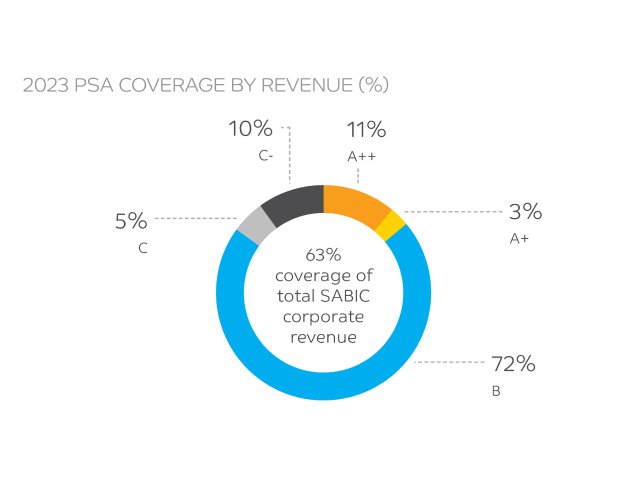INNOVATION AND SUSTAINABILITY SOLUTIONS
As a materials company positioned between the extraction and the consumer goods industries, innovation is the linchpin that connects our ambitious growth agenda with our focus on the needs of our customers and our sustainability goals.
- Customer Centricity
- Innovation and Sustainability Solutions
- Product Stewardship
- Our Manufacturing Assets
- Digitalization
- Cybersecurity
- Environment, Health, Safety, and Security
- Climate Change and Resource Efficiency
- Supply Chain
- Procurement
- Raw Materials
- Our People
- Toward Saudi Vision 2030: Driving Local Content
- Communities
- Ethics, Compliance, and Human Rights
-
11,070
Total active patent portfolio (inclusive of 73 from Hadeed)
-
224
New priority patent applications
-
632
open active R&D projects of all types
-
67%
% of total active patent portfolio* with a PSA-derived sustainability classification
-
68%
% of new priority patent applications* with a PSA-derived sustainability classification
-
SAR 1.89 Bn.
(US$ 504.8 Mn.) R&D expenses
ASSESSING OUR PORTFOLIO ON SUSTAINABILITY PARAMETERS
We conduct assessments of the sustainability of our applications and products to enable better decision-making and more impactful, market-driven sustainability and innovation strategies. This, in turn, allows us to create stronger and long-lasting partnerships with our customers, while meeting stringent environmental regulations.
The portfolio sustainability assessment (PSA) methodology includes consideration of basic stakeholder requirements, such as the safety compliance of the substances in the final product and risks, regulatory trends, and relevant sustainability ambitions in the value chain. In addition, the methodology analyzes the performance of the products in specific applications against benchmarks.

We applied the PSA methodology to a broad part of our business for the first time in 2022. This year, we increased coverage to 63% of total corporate revenue by including most of our chemical products in the assessment. We have assessed 430 grades in 179 products/applications. To date, we have identified:
- 14% of our portfolio - Advanced (A ++) or Progressing (A+) solutions. This includes product/ applications such as foam insulation, lightweighting applications in key segments such as mobility, high purity applications in healthcare and hygiene segments, and low-carbon products. Such products contribute to reducing customers’ carbon footprints or to the conservation of resources at the application level.
- 15% of our portfolio - Flagged (C-) or Challenged (C--) product/applications. These negative scores are related to aspects of the product applications such as substances of concern used in additives, which are addressed by SABIC’s Safer Chemistry program, or related to risks derived from regulatory developments, customer expectations, and end-user responsibility, which are being addressed by SABIC’s TRUCIRCLE™ portfolio and other low-carbon solutions.
In the coming years, the PSA will be a crucial tool in enabling SABIC to accelerate growth in sustainable sectors and increase our abilities to help challenged sectors become more sustainable, while also promoting a circular economy model. Ultimately, the PSA will be a robust tool to steer our product portfolio toward more sustainable solutions.
This year, a more advanced PSA methodology has been developed and implemented in accordance with the PSA v2.0, launched by the World Business Council for Sustainable Development (WBCSD) in September 2023.
PRODUCT CARBON FOOTPRINT
Also this year, a Product Carbon Footprint (PCF) pilot project was launched targeting two of our manufacturing sites: Al-Bayroni ammonia and urea plants in Jubail, Saudi Arabia, and the Bergen op Zoom polycarbonate plant in the Netherlands.
Scaling up this project across our operations will enable us to efficiently evaluate PCFs for our business portfolio using standardized, industry-based calculation. This, in turn, will allow us to respond to our customer’s increasing expectations of transparency about the carbon footprints of our products.
Read more about our combined approach to technology, innovation, and sustainability at SABIC.
COLLABORATING FOR INNOVATION
We view external collaborations as essential to accelerating technology delivery and advancing disruptive innovation. Our collaborators include international universities and institutes (such as the Massachusetts Institute of Technology, Peking University, and the University of Toronto); technology ventures (such as Finboot Tech, LO Circularity Fund, and BiOWiSH Technologies); and Saudi Arabian universities and institutes (such as King Saud University, King Abdulaziz City for Science and Technology, and Qassim University).
Synergies with Saudi Aramco
Saudi Aramco and SABIC collaborate across the value chain, merging expertise in extraction, efficient manufacturing of chemicals and plastics, novel material and application development, and recycling of materials. Together, we innovate in sustainable chemical production, streamlining processes, and developing novel catalyst systems to enhance efficiency and reduce waste.
Saudi Aramco and SABIC’s respective research and innovation teams are collaborating on a number of joint projects under work streams covering decarbonization, circular plastics, licensing and technology deployment, venturing, liquid-to-chemicals conversion, and non-metallics, among others. We jointly develop solutions for high-pressure demands for oil and gas pipelines, electric vehicles, and solar panels, aiming for substantial sustainability enhancements. Our efforts also extend to circular polymers via novel chemical or mechanical recycling routes, joint developments for lower-carbon products, and advanced assessments in low-carbon ammonia and hydrogen production.
One specific example is developing a sustainable solution for asphalt compatibilization based on a proprietary functionalized polypropylene platform developed by SABIC and Material Science Ltd. This compatibilizer will enable incorporation of post-consumer ground tire rubber into roads at twice the weight percentage compared with the incumbent best-in-class solution based on styrene-butadiene rubbers. Both Saudi Aramco and SABIC also manage critical processes and engage in university collaborations and new business opportunities and partnerships to explore and develop sustainable technology innovations.
Read more about our combined approach to ventures and collaborations for innovation.
Disclaimer: This abridged interactive version of the SABIC Integrated Annual Report 2023 is based on the original PDF report published on this website. In case of any discrepancy, the original PDF report will prevail.
